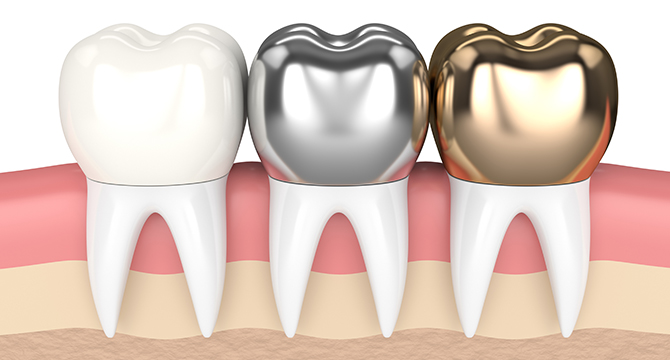Crowns
Crowns are used to fully cover a tooth that is weak or too decayed to be fully restored with a filling. This is generally done following a root canal treatment or when a large filling wears out. A weakened tooth is at risk of breaking or cracking, which is a serious matter and much more difficult to treat. Crowns ride over the weakened tooth, restoring strength and protecting the tooth from additional damage that can be caused by normal biting and chewing.
Inlays and Onlays
When a tooth repair is required due to decay, but the damage is too extensive for a traditional filling, an inlay or onlay may be the best option.
Inlays and onlays are constructed with materials like ceramic or resin and can be either gold or tooth-colored. Like a traditional filling, inlays and onlays fill in the space of a cavity, or tooth decay to repair the tooth; however, unlike traditional fillings, inlays and onlays are molded in a lab and then bonded directly to the tooth. The main difference between inlays and onlays is that an inlay fills just the inside of a tooth where an onlay can fill the inside and also extend over the top of a tooth.
Inlays and onlays are not right for every scenario. If tooth decay is minimal, a traditional filling could be the correct route. If tooth decay is deemed too severe for an inlay or onlay, a crown might be the next option.
Denture Options
Dentures
When bone loss around the roots of teeth is great enough to loosen them, or allow them fall out, it’s time for dentures. There are different types of dentures, such as implant dentures and conventional dentures, but they all share a common goal – replacing your natural teeth, recreating your smile, and allowing you to eat regular foods.
Conventional Dentures (Full & Partial)
Our denture process begins by examining the entire mouth. We need to assess the health of your teeth and jaw, and to determine which teeth, if any, can remain. Partial dentures can be created if there are natural teeth that are healthy and strong enough to remain in the mouth. Complete dentures are made when all teeth need to be extracted. Following the extraction of the loose or unhealthy teeth, there is an adjustment period. Your gums will need to heal and you will need time to adjust to your dentures. Once accustomed to the dentures, however, you’ll enjoy full functionality and an improved appearance.
Implant Retained Dentures
If you are a candidate for dentures, you may want to consider Implant Retained Dentures. Unlike conventional dentures, implant retained dentures won’t slip, they function just like natural teeth and are more comfortable to wear. No messy adhesives are needed, and you won’t experience any of the typical mouth irritations, such as mouth sores, that often plague those with traditional dentures. Another added benefit is improved taste. Implant Retained Dentures don’t cover the roof of your mouth, so you’ll be able to enjoy all the flavors of your foods again! Maintenance is easy, since you can remove them for cleaning.
The denture process includes the removal of any remaining teeth and the use of temporary (transitional) set of dentures while your mouth heals. The next step, is placement of your implants (up to four per jaw) in areas where you have the highest bone density, which is typically the front of your mouth. While you are healing from the implant procedure, your dentures are fabricated. The final visit is placement of the abutments and your dentures.
Hybrid Implant Dentures
Hybrid Implant Dentures share the same advantages as Implant Retained Dentures, with one significant difference – they are permanent. Your dentures can only be removed by your dentist. The process is also very similar, but you typically have more implants placed. This may require additional procedures, such as bone grafts, to ensure your jaw is stable enough to support the implants. If you’re looking for the next-best-thing to full implants, Hybrid Retained Dentures are the solution.
If you need additional information on any of our services or would like to schedule a consultation to discuss your dental treatment options, please contact us. We’d be happy to work with you to find a solution that fits into your budget.


